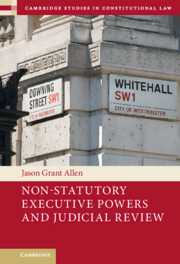Book contents
- Non-Statutory Executive Powers and Judicial Review
- Cambridge Studies in Constitutional Law
- Non-Statutory Executive Powers and Judicial Review
- Copyright page
- Dedication
- Contents
- Acknowledgements
- Table of Cases
- 1 Introduction
- 2 Official Action beyond Statute
- 3 The ‘Third Source’ in the Courts
- 4 A Unified Category of ‘Non-Statutory Executive Powers’
- 5 The Crown as Corporation
- 6 Public Law as the Law of Public Offices
- 7 Office in Action
- 8 Approaching Judicial Review
- 9 Competence, Conduct, and Validity
- 10 Moving beyond the Ultra Vires Debate
- 11 The Common Law Theory of Ultra Vires
- 12 The Borders of the Supervisory Jurisdiction
- 13 The Normative Foundations of Judicial Review
- Index
11 - The Common Law Theory of Ultra Vires
Published online by Cambridge University Press: 18 August 2022
- Non-Statutory Executive Powers and Judicial Review
- Cambridge Studies in Constitutional Law
- Non-Statutory Executive Powers and Judicial Review
- Copyright page
- Dedication
- Contents
- Acknowledgements
- Table of Cases
- 1 Introduction
- 2 Official Action beyond Statute
- 3 The ‘Third Source’ in the Courts
- 4 A Unified Category of ‘Non-Statutory Executive Powers’
- 5 The Crown as Corporation
- 6 Public Law as the Law of Public Offices
- 7 Office in Action
- 8 Approaching Judicial Review
- 9 Competence, Conduct, and Validity
- 10 Moving beyond the Ultra Vires Debate
- 11 The Common Law Theory of Ultra Vires
- 12 The Borders of the Supervisory Jurisdiction
- 13 The Normative Foundations of Judicial Review
- Index
Summary
This chapter present my own theory of judicial review, which I call a ‘common law ultra vires theory'. Based around the logic of ‘acting beyond one's powers', judicial review follows the narrow and broad limb. Although statutory provisions will be relevant and even dispositive where they exist, both of these limbs have roots in the common law supervisory jurisdiction of the judicial office to interpret and enforce the rules of competence and rules of conduct that empower and constrain executive officials. This theory of judicial review applies naturally and without distortion to statutory and non-statutory executive powers alike, and, within the latter category, no further distinctions need to be made between those powers associated with the Royal Prerogative and those that follow as a logical consequence of the Crown being a corporation with legal personality – or indeed any other basis of executive vires. Looking at recent UK Supreme Court jurisprudence for indirect but significant support, I argue that ‘justiciability'and ‘deference’ have a more limited role to play in the theory and practice of judicial review than first appears – even in the context of the ‘high’ prerogatives.
Keywords
- Type
- Chapter
- Information
- Non-Statutory Executive Powers and Judicial Review , pp. 257 - 277Publisher: Cambridge University PressPrint publication year: 2022



